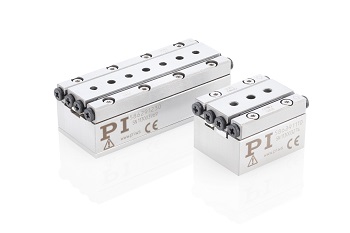Physik Instrumente (PI) has now introduced vacuum-compatible versions of the LPS-24 series: Under vacuum conditions down to 10-6 hPa, the miniature stages of only 24 mm in width achieve a sub-nanometer resolution over a travel range of 15 mm.
Thus, they fulfil important requirements for the positioning of optical and mechanical components or for the adjustment and manipulation of samples in vacuum with a confined space.

The position is measured with an integrated linear encoder that has a resolution of 150 nm or 20 nm. PI's own linear encoder PIOne even achieves a resolution of 0.5 mm and a minimum step size of 1 nm.
A version of LPS-24 for ultra-high vacuum up to 10-9 hPa is available. It allows the smallest incremental motions of 40 nm.
Smooth nanostepping mode
In the stage series LPS-24 PI uses directly driven NEXACT® stepping drives. They combine the benefits of piezo actuators as regards resolution, stiffness and vacuum compatibility with long travel ranges. A position-controlled system with NEXACT® drive allows a constant and consistent nanostepping mode along a predefined motion profile to the target position. Thanks to this functional principle, the LPS-24 linear positioning stages reach not only a high positioning accuracy, but also a high path accuracy.
During the stepping motion, the contact between individual actuators and the moved rod is based only on static friction. Besides, this results in a substantial increase in the lifetime and reliability of the drives.
Easy system integration and extensive software
The E-861 controller can be used to operate the miniature positioning stages easily and accurately: It supports the motion types of the piezo stepping drive and is adapted to the requirements of the mechanical system. As a result of the controller's networking capability, up to 16 controllers can be driven simultaneously via one computer interface.
All parameters can be set and checked via software. For start-up and system configuration, the PIMikroMove® program is included in the scope of delivery. Connection to custom software is possible via LabVIEW drivers and DLLs.
For more information go on PI's website.